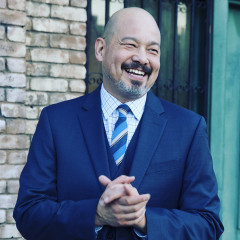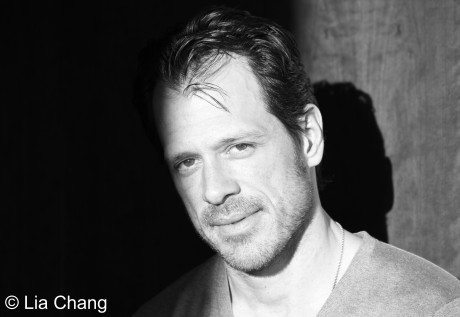Entertainment Spotlight
Actor Tim Lounibos - Hopeful Opportunities Ahead for APA's in Hollywood Movies and Television
Up Close and Personal with Darren Pettie, Star of The Milk Train Doesn't Stop Here Anymore
“The early Sixties have been good to me lately,” said Darren Pettie, whose diverse roles circa 1960′s include his turn as Lucky Strike scion Lee Garner, Jr. in several episodes of the critically acclaimed and award winning AMC TV series “Mad Men”; as James in Atlantic’s Off-Broadway production of Harold Pinter’s The Collection penned in 1961; and as Christopher Flanders in the Roundabout Theatre Company’s current production of Tennessee Williams’ The Milk Train Doesn’t Stop Here Anymore, with Olympia Dukakis, set in 1962.
Erik Haagensen of Backstage.com describes Christopher Flanders as a “former poet, aging pretty boy, and professional houseguest,” and notes, “as Chris, Darren Pettie is properly fraying at the edges, an intriguing mix of calculation, sympathy, arrogance, and sexual magnetism.”
Williams’ haunting drama takes place in Flora Goforth’s picturesque Italian mountaintop home, where the wealthy American widow, in denial over her impending demise, has sequestered herself from the world in order to write her memoirs. Pettie’s character is a handsome and mysterious young poet who arrives without warning to keep Flora company in her final hours. It is a dreamlike play that blossoms into a fascinating meditation on life and death.
This production of Williams’The Milk Train Doesn’t Stop Here Anymore is actually a compilation of different drafts woven together by director Michael Wilson.
“That’s been thrilling because it’s been like working on a new Tennessee Williams play,” said Pettie. “Yesterday was Tennessee Williams birthday. Milk Train is a play he loved. I’m glad to be doing this play because I feel he would be happy to know that not only are they still doing the plays that were his greatest hits, that even these plays that didn’t do so well are being produced. It ‘s like when you are working on a new play and writers come in with new pages. That’s what was happening during our rehearsal process.”
The Milk Train Doesn’t Stop Here Anymore began performances on January 7th at the Laura Pels Theatre, at the Harold and Miriam Steinberg Center for Theatre, 111. W. 46th St in New York and has been extended until April 10th.
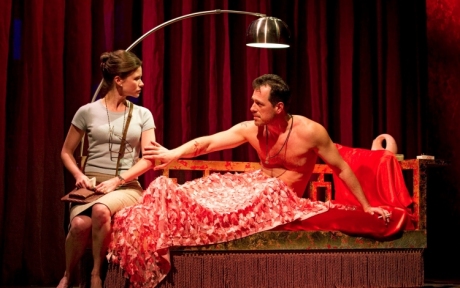
Maggie Lacey as Blackie and Darren Pettie as Christopher Flanders in The Milk Train Doesn’t Stop Here Anymore. Photo by Joan Marcus
For Pettie, everything about Chris is a contradiction.
"Those are the things I love to play, opposing sides, he said. “Chris has a creative side, he makes mobiles, and he was a poet. He had this one book published. With Mrs. Ferguson, he was introduced to this jet set world. He comes from a humble background, has been a gigolo and a ski instructor, and is just trying to survive.”
For this version, director Michael Wilson decided Pettie should play against the mystical aspect of the character.
Pettie shared, “Chris had the experience where he walked to Baja and connected with a Hindu teacher, and helped him die out of a sense of compassion. He walks this line: Am I good? Am I an opportunist? In his experience with Mrs. Goforth, he finally does realize that he is here to help her with dignity and acceptance. Every time he hears the ocean crash, the boom is like this ohm, the sound of the universe. He’s being reminded of the spiritual nature of the work that he’s there to do. She keeps dragging him back into the physical world, because of his hunger, tempting him with the food, the sex. He’s willing to do all of these things at different points, but the sounds of the ocean keep dragging him back. Tennessee does this with all of his characters, he shows their humanity. We’re full of light and darkness, yin and yang. There’s a little bit of that in all of us.”
I caught up with the Alabama native after his Sunday matinee of Milk Train, to talk about his path to becoming an actor, what it’s like to play with Olympia Dukakis, and the phenomenon of “Mad Men”.
From Desert Storm to Julliard
Pettie joined the Navy fresh out of high school and was stationed in Norfolk, VA, aboard the USS Guam. For someone who had never ventured out of the South – the Persian Gulf during Desert Storm, Yugoslavia, Bosnia, the Adriatic Sea, the Mediterranean -were parts of the world that he experienced during his tour of duty from 1989-1993.
“It was while I was in the Navy that I started thinking about being an actor,” he said. “In Alabama, we had no arts programs. We had a teacher who came from a bigger town who started a drama class that I took and I really liked it. But I had no clue as to what you did. I figured you went to New York or LA.”
He was living in LA and taking acting courses at Santa Monica College when his teacher suggested he audition for Julliard, to be classically trained. He auditioned in San Francisco and got in.
“I was a little older than the other students who were auditioning, I was lucky,” he recalled. “I turned 27 the month before class started.”
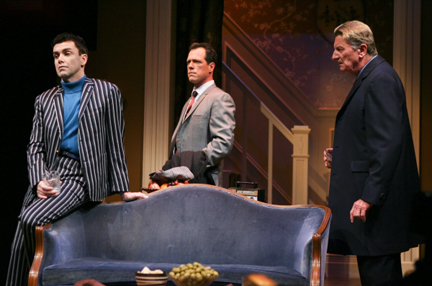
Atlantic’s Production of Harold Pinter’s The Collection. (l-r) Matt McGrath, Darren Pettie and Larry Bryggman Photo by Ari Mintz
Pettie made his Broadway debut as Reg Nuttall in Simon Gray’s Butley opposite Nathan Lane. Off-Broadway, he appeared in This and Spatter Pattern at Playwrights Horizons, Hillary, A Modern Greek Tragedy with a Somewhat Happy Ending at New Georges, Terrence McNally’s Dedication or the Stuff of Dreams at Primary Stages, Hobson’s Choice at the Atlantic Theater, Unwrap Your Candy at the Vineyard Theater, Measure for Measure at NYSF. His regional credits include: How the Other Half Loves (Westport), Don’t Dress for Dinner (Royal George), The Cry of the Reed (Huntington), The Taming of the Shrew (Commonwealth Shakespeare Co.), Dedication or the Stuff of Dreams (WTF), The Shatter Hand Massacre (Berliner Festspiele). In Ang Lee’s Taking Woodstock, he played Paul, a sweet guy who is easy with his sexuality, but not gay in his demeanor, and appeared in the films The International, Four Single Fathers, and Ghost Town. He has guest starred on the TV shows “Numb3rs,” “CSI,” “Crossing Jordan,” “Brothers and Sisters,” “Line of Fire,” “Charmed,” “Law & Order: SVU,” “Without a Trace,” and “Gossip Girl.”
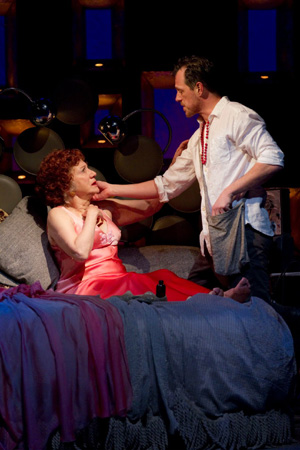
Roundabout Theatre Company’s The Milk Train Doesn’t Stop Here Anymore (l-r) Olympia Dukakis and Darren Pettie Photo credit: Joan Marcus, 2011
It has been an amazing ride on this Milk Train for Pettie.
“Working with Olympia is great,” he shared. “As actors, we’re always trying to feel validated in some way, that we are meant to be doing this. Olympia and I have scenes where we really go at it. When you get to work with someone of that nature, it makes you feel like you belong. I love to do it, and not just with her, but also with Gordana (Rashovich), with Maggie (Lacey), with Edward (Hibbert). Olympia is there to play. If you are having an inspired night, and you’re amped, she takes it and responds in kind. She does the same thing to you and if you are ready, it’s a thrilling experience. I am up here with her and we’re feeding off each other. We had a really good week this week, where we felt the show took a turn. She said this to me an hour ago, after the scene when she dies. That’s the best.”
When Pettie first read the play, he zeroed in on the Beat poets, as the poets that Chris Flanders would be influenced by.
“They were the first American poets that I really knew of – Jack Kerouac, Gary Snyder, Alan Ginsberg - who started to study Hinduism and Buddhism,” he said. “Later on, when the Beatles did it, it became very trendy, but this is 1962. Jack Kerouac was writing The Dharma Bums and talking about Eastern philosophies. Gary Snyder lived in Japan. Those guys were not ethereal, they were flesh and blood men, dusty, and on the road. That was the book that young men went crazy for. I read all of those guys when I was in my early 20’s. That’s how I pictured him. In the opening of one of the versions of this play (there’s a few different drafts that Tennessee wrote), he describes Chris as a prize fighter, like he’s fought one too many rounds, weary, almost deranged looking. These guys were poets.”
Lucky Strike scion Lee Garner, Jr., as portrayed by Pettie, is a character that viewers love, and love to hate. The “Mad Men” Season 4 DVD just came out and Lee Garner, Jr. figures prominently in the “Christmas Comes But Once A Year” and the “Hands and Knees” episodes.
“I’m surprised that I’m so associated with this show,” he said. “I’ve only done four episodes for a show that has been running for four years. The character is pretty central to what is going on. I went in to audition for the pilot, which was just a one day thing and got the part. All I’d read was the one scene. I didn’t know anything else about it.”
“This is what is funny about acting to me,” he mused. “I’ve done more work on Chris Flanders than I ever did on Lee Garner, Jr., but Lee Garner, Jr. is a character that people have really responded to. Since I’m from the South, I put in that old school North Carolina. With “Mad Men,” the writing is so good, the wardrobe department, the design element is incredible. They put you in those clothes, which are so specific. They gave me a lighter that they thought Lee Garner would use, because it is a very expensive lighter. The cuff links, the rings, certain tie clips, the hair. And you don’t have to do any work. I gave him a little swagger. They wanted to bring me back for another episode that first season, but I had already planned my trip to China. The show aired while I was in China. I came back and it was a hit. I met some of the writers when they brought me back for the third season, who told me how much they loved writing for my character.”
Even with his hectic acting career, Pettie manages to have a new cultural experience every year. In 2008, he visited Beijing for the first time.
“I got a sense of living in Beijing for a few weeks while staying at my friend’s place, whom I have known since I was 13 years old,” he said. “He was working during the day, so I hung out with him at night. I’d take off and go to The Forbidden City. My favorite thing to do was to go to the Hutong. I could spend time in those Hutong areas for days and never get bored. That was magic to me. There’s a street, lined with cherry blossoms, that borders the Forbidden City. I would go into the Tea shop and people would talk to me. It’s fascinating, because being there with my buddy that lived there, I got to meet a lot of Chinese people that I would not have met if I was just a tourist. They were very open. You get the sense of what’s happening- the global shift and the creative burst that’s going on in cities like Beijing and Shanghai. People are coming from other parts of the world to live there. I was amazed to go out at night and see all of those restaurants packed. It had the same buzz as New York.”
TICKET INFORMATION:
The Milk Train Doesn’t Stop Here Anymore has performances at the Laura Pels Theatre, at the Harold and Miriam Steinberg Center for Theatre, 111. W. 46th St in New York through April 10th. Tickets are $71.00 – $81.00, and are available by calling Roundabout Ticket Services at (212)719-1300, online at www.roundabouttheatre.org or at the Laura Pels Box Office (111 West 46th St.).
Through April 3, 2011
Tuesday-Saturday at 7:30pm, Wed, Sat & Sun Matinees at 2pm
Ms. Dukakis will not be performing Wednesday evening performances through 3/30/11. For these performances, Gordana Rashovich will perform the role of Flora Goforth.
April 5 – 10, 2011
Tuesday-Saturday at 7:30pm
Sun Matinee at 2pm
Laura Pels Theatre
Harold and Miriam Steinberg Center for Theatre
111. W. 46th St.
New York
- Tags: (IAAC), (NYIFF), 11th Annual New York Indian Film Festival, Backstage Pass with Lia Chang, Entertainment, Fatakra, Film, Hindu, Indian film festival, Indo-American Arts Council, Lia Chang, Muslim, Raju, Rehana Mirza, Samrat Chakrabarti, Shiva Shankar Bajpai, Soham Mehta, Sundaram Tagor, Zameer & Preeti: A Love Story


